Courtesy: Dominique Hérailh
This data is courtesy of the French Swimming Federation.
The French Swimming Federation has released detailed statistics on all the swimming finals at the Paris Olympics, and in this article, we’ll break down the final of the women’s 400 IM.
Summer McIntosh and the 400 IM in Paris: excellent, but room for improvement
The two 400IM finals, the women’s and the men’s, appeared similar due to the dominance of Summer McIntosh and Leon Marchand.
Before analyzing the details of the race, we wanted to see if this similarity in appearance was reflected in the characteristics of each of the swims.
To do this, we compare the time differences at each of the 50-meter intervals. The results are shown in the graph below.
The result is quite surprising, even though Leon Marchand‘s preferred stroke is breaststroke.
While the average percentage difference between strokes other than breaststroke is 7.4%, for breaststroke it is between 15 and 20%, i.e. more than double.
Despite her relative weakness in this store, Summer McIntosh nevertheless managed to dominate her competitors by a wide margin.
This raises the following question: What would be her margin for improvement if her breaststroke times were at the same level as the other strokes (i.e. +7.4% better than Marchand)? The result is impressive: her 400 IM time in Paris would have been 6.89 seconds better—4:20.82.
Of course, there is no guarantee that she could have done as well in the other strokes had she made such an effort in breaststroke, but it does give an idea of her potential. The second lesson we can learn from this is that Marchand is excellent in all strokes, so he may have less room for improvement, except perhaps in freestyle.
Now, let’s break down the race.
Before breaking down the race into 100-meter segments, let’s take a general look at how rankings and gaps evolved over the course of the race.
A) Ranking Evolution
We saw three different races:
- The leader’s race (McIntosh)
- The runner-up’s race (Grimes)
- The rest of the field battling for third place.
B) Gap Progression
Two highlights stand out:
- Katie Grimes held off Summer McIntosh‘s breakaway for the first 200 meters. It was on the breaststroke that the gap widened, unlike the other competitors who either stabilized or reduced the gap.
- Emma Weyant‘s second half of the race was excellent, reducing her gap to McIntosh by 1.33 seconds. She set the fastest time of the finalists over the last 200.
Breaking down the race
We will break down the race by 100-meter segments, plus the start.
The Start
Despite a slightly slow reaction time, Summer McIntosh was second at the 15-meter mark, 0.01 behind Ella Ramsay, who had the longest underwater (13.73 m). It’s interesting to note that, apart from at the start, McIntosh’s underwaters were shorter than those of her competitors. Katie Grimes, for example, swam almost 10 meters further underwater.
If we add the time taken to pass the 15-meter mark to the time taken to pass the five-meter mark after each turn (15 +7 x 5=50m), we obtain the following results expressed in meters/second. We can see that McIntosh is only in third place, well behind Grimes and Ramsay.
First 100 Meters
It was in this stroke that McIntosh was most dominant.
The graph below shows the different swimming characteristics that led to significant differences. Apart from Grimes, who swam in an almost similar way to McIntosh but with less efficiency, the other swimmers were either very far apart in distance per stroke (DPS), stroke rate, or both.
The red line represents the line of equivalence of McIntosh’s performance with a different frequency or amplitude. For example, Katie Grimes would have had to either increase her amplitude by 1.7% at a constant stroke rate, or increase her frequency by 1.7% at a consistent DPS to be able to keep up with McIntosh.
100-Meter Rankings
| Rank | Swimmer | Time |
| 1 | Summer McIntosh | 58.50 |
| 2 | Katie Grimes | +1.35 |
| 3 | Freya Colbert | +4.08 |
| 4 | Emma Weyant | +4.28 |
| 5 | Ella Ramsay | +4.29 |
Second 100 meters
The gaps continued to widen throughout the backstroke, except for Grimes, who lost just two-tenths thanks to her turns.
The graph below shows that Grimes almost matched McIntosh in terms of DPS and stroke rate (-0.8%). The other swimmers had a much lower DPS than the first two.
200-Meter Rankings
| Rank | Swimmer | Time |
| 1 | Summer McIntosh | 02 :05.59 |
| 2 | Katie Grimes | +1.56 |
| 3 | Freya Colbert | +6.29 |
| 4 | Emma Weyant | +8.55 |
| 5 | Ella Ramsay | +9.07 |
Third 100 meters
It was from the start of the third 100 meters that the race became more balanced. Ella Ramsay and Emma Weyant were the fastest in the breaststroke, taking back more than a second from McIntosh for Ramsay and 0.77 seconds for Weyant.
The graph below shows that the characteristics of McIntosh’s breaststroke are markedly different from those of her competitors. Her DPS is low, which translates into a high stroke rate but insufficient to keep pace with the first two.
300-Meter Rankings
| Rank | Swimmer | Time |
| 1 | Summer McIntosh | 3:24.95 |
| 2 | Katie Grimes | +4.96 |
| 3 | Freya Colbert | +7.57 |
| 4 | Emma Weyant | +7.78 |
| 5 | Ella Ramsay | +8.01 |
Fourth 100 meters
In the first 50 meters, Emma Weyant was the fastest, ahead of Freya Colbert and McIntosh. McIntosh came home fastest in 30.76.
400-Meter Rankings
| Rank | Swimmer | Time |
| 1 | Summer McIntosh | 4:27.71 |
| 2 | Katie Grimes | +5.69 |
| 3 | Emma Weyant | +7.22 |
| 4 | Freya Colbert | +7.96 |
| 5 | Ella Ramsay | +10.30 |
| 6 | Mio Narita | +11.12 |
| 7 | Katie Shanahan | +12.46 |
| 8 | Ellen Walshe | +12.99 |
To summarize:
- Katie Grimes kept in touch on the first 200 meters, thanks in part to her underwaters. Her next 200 meters were the slowest of the top five swimmers.
- Emma Weyant was the fastest swimmer over the last 200 meters, but her front half kept her out of the race for silver.
- Summer McIntosh won the event by a wide margin but did not dominate every area of the race. She seems to have room for improvement in breaststroke and underwaters. At just 18, she is already putting in some exceptional performances. If she manages to improve in the two areas mentioned above, the world record for the 400 IM will reach new heights.
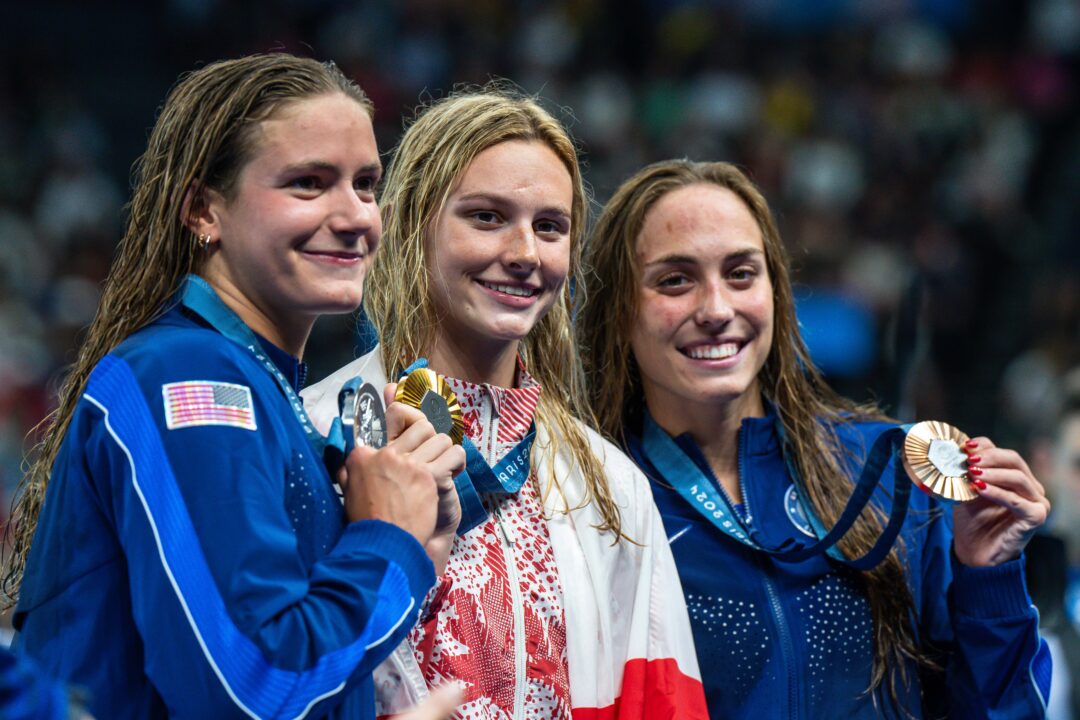
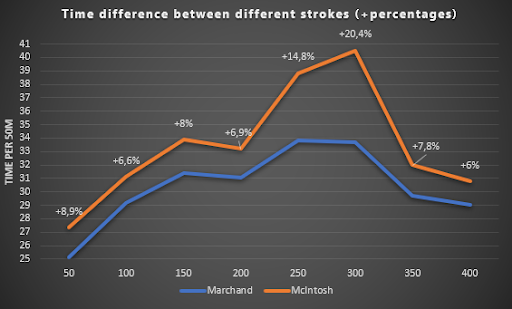
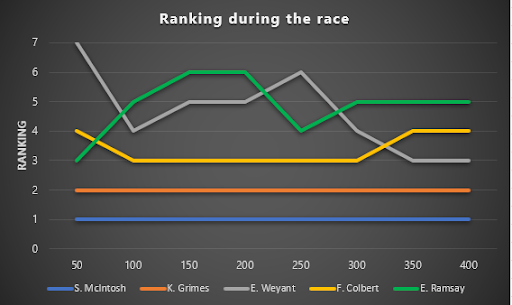
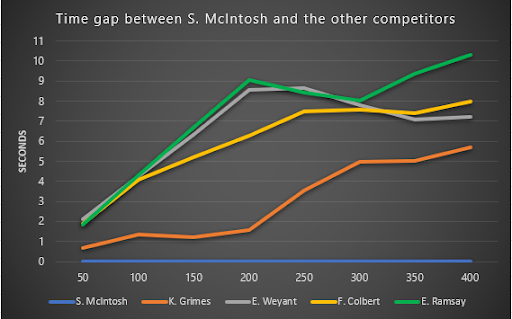
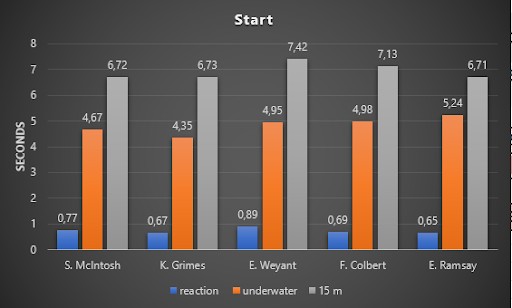
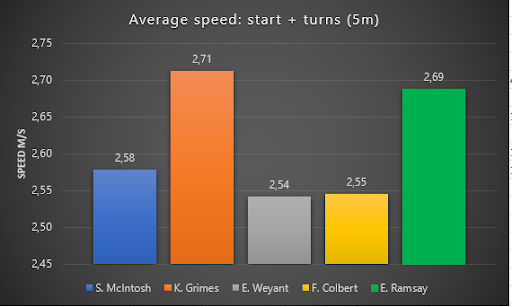
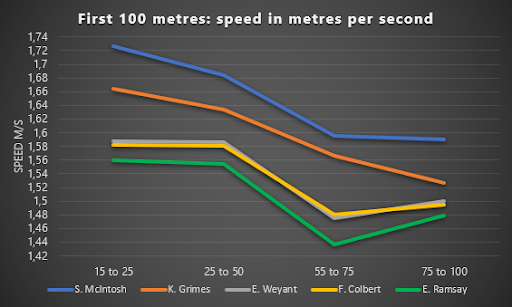
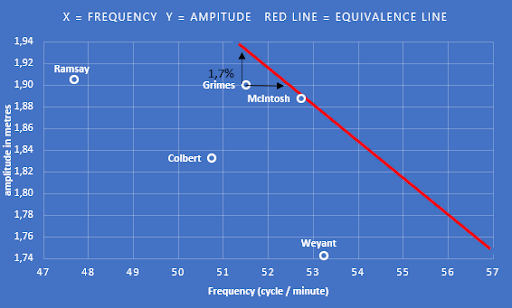
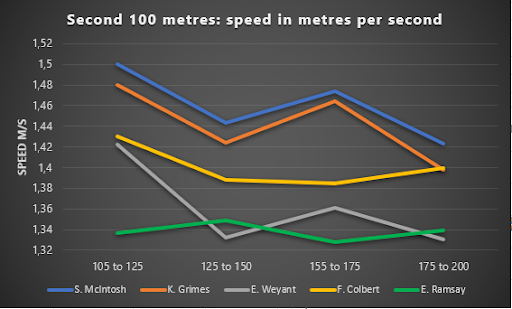
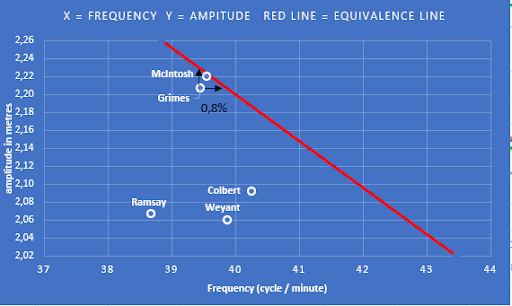
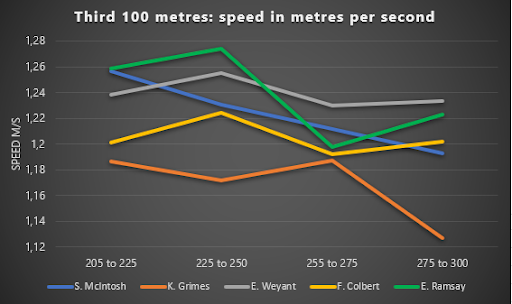
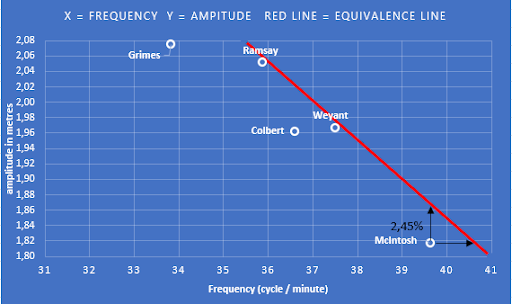
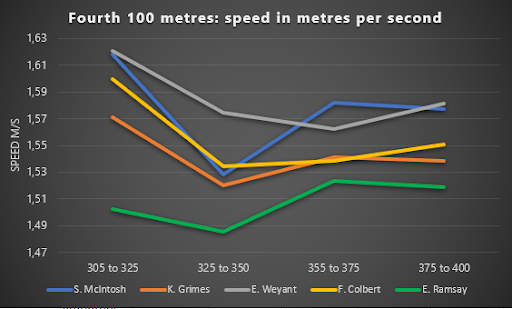
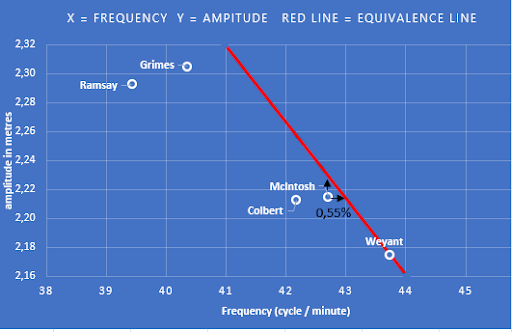
The main (and very interesting) objective of this article is about the dynamics of this one race but once you included some discussion about SM improving performance to push the world record to ‘new heights’ then you should have included the context that she already holds the world record at 4:24.38 (3.3. seconds faster than Paris 4.27.71) One could say her world record is already well on the way to ‘new heights’?
Yes, I could have said “her world record” but I thought that was obvious. At the beginning of the article I assumed that if she had the same performances in the breaststroke as in the other 3 strokes, she could get close to 4:20. Those are the “new heights” I was talking about at the end.
LA 2028, McIntosh can win 200 free, 400 free, 800 free, 200 im, 400 im, 200 fly.
O’Callaghan, Titmus and Ledecky are older.
Summer is amazing but this is unrealistic…between the schedule conflicts, the absurd volume of meters to be swum, and how competitive these events are, she’s more likely to have a Katie Hoff ‘08 Olympics than something that’s truly remarkable. I think she could MAYBE add the 2 free to her schedule but would have to choose between the 8 free and 2 IM
love how nerdy this is, short course worlds is gonna be really interesting for when world records fall!
hope she was out of Sarasota during the hurricane scary times there
She was! Flew to TO and then to NYC for Time gala